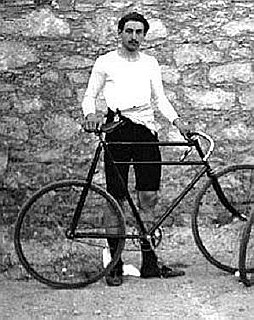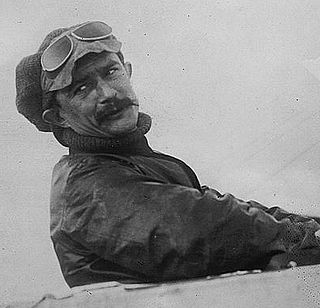 W
WGeorges Yvan "Géo" André was a French track and field athlete and rugby union player. As an athlete he competed at the 1908, 1912, 1920 and 1924 Summer Olympics in various events, including long jump, high jump, 400 m sprint, 110 and 400 m hurdles, pentathlon and decathlon. He won a silver medal in the high jump in 1908 and a bronze in the 4 × 400 m relay in 1920, finishing fourth in the 400 m hurdles in 1920 and 1924 and fifth in the standing high jump in 1908. At the 1924 Olympics he took the Olympic Oath and served as the flag bearer for the French delegation.
 W
WFrançois d'Astier de La Vigerie was a French military leader during two World Wars.
 W
WMaurice Bellonte was a French aviator who set flight distance records.
 W
WFrancis Carco (1886–1958) was a French author, born at Nouméa, New Caledonia. He was a poet, belonging to the Fantaisiste school, a novelist, a dramatist, and art critic for L'Homme libre and Gil Blas. During World War I he became an aviation pilot at Étampes, after studying at the aviation school there. His works are picturesque, painting as they do the street life of Montmartre, and often being written in the argot of Paris. He has been called the "romancier des apaches." His memoir, The Last Bohemia: From Montmartre to the Latin Quarter, contains reminiscences of Bohemian life in Paris during the early years of the 20th century.
 W
WGeorges Carpentier was a French boxer, actor and World War I pilot. He fought mainly as a light heavyweight and heavyweight in a career lasting from 1908 to 1926. Nicknamed the "Orchid Man", he stood 5 feet 11 1⁄2 inches (182 cm) and his fighting weight ranged from 147 to 175 pounds. Carpentier was known for his speed, his excellent boxing skills and his extremely hard punch. The Parisian Sports Arena Halle Georges Carpentier is named after him.
François Coli was a French pilot and navigator best known as the one-eyed flying partner of Charles Nungesser in their doomed, fatal attempt to achieve the first transatlantic flight.
 W
WLéon Flameng was a French cyclist and a World War I pilot. He competed at the 1896 Summer Olympics in Athens, winning three medals including one gold.
 W
WEugène Adrien Roland Georges Garros was a French pioneering aviator and fighter pilot during World War I and early days of aviation. In 1928, the Roland Garros tennis stadium was named in his memory; the French Open tennis tournament takes the name of Roland-Garros from the stadium in which it is held.
 W
WMarie Marvingt was a French athlete, mountaineer, aviator, and journalist. She won numerous prizes for her sporting achievements including those of swimming, cycling, mountain climbing, winter sports, ballooning, flying, riding, gymnastics, athletics, rifle shooting, and fencing. She was the first woman to climb many of the peaks in the French and Swiss Alps. She was a record-breaking balloonist, an aviator, and during World War I she became the first female combat pilot. She was also a qualified surgical nurse, was the first trained and certified flight nurse in the world, and worked for the establishment of air ambulance services throughout the world. In 1903 M. Château de Thierry de Beaumanoir named her the fiancée of danger, which newspapers used to describe her for the rest of her life. It is also included on the commemorative plaque on the façade of the house where she lived at 8 Place de la Carrière, Nancy.
 W
WJean Marie Dominique Navarre was a French aviator during World War I. As one of the pioneer flying aces, he was credited with twelve confirmed aerial victories and fifteen unconfirmed ones.
 W
WHenri Salmet was an early French aviator
 W
WPaul Marcel Teste was a French Navy officer aviator, notable for the first aeronaval landing of the French Navy aboard the Béarn.
 W
WLieutenant Colonel Georges Thenault was the commander of the Lafayette Escadrille – the famed branch of the French air force in World War I composed of American volunteer pilots. The Lafayette Escadrille was created before the United States gave up its neutrality and joined France and Britain in the war against Germany. Once the United States formally entered the war, the Lafayette Escadrille was absorbed into the U.S. Army.
 W
WJules Charles Toussaint Védrines was an early French aviator, notable for being the first pilot to fly at more than 100 mph and for winning the Gordon Bennett Trophy race in 1912.
 W
WMaurice Vinot, was a French film actor of the early 20th-century whose career ended in 1916 when he was killed in an airplane accident in Pontlevoy, France after enlisting in the military to fight in World War I.